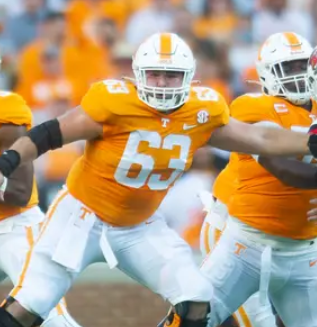Tennessee’s football program has plenty of things working in its favor right now. One is tempo. Any potential alteration to the Vols’ sprinting style on offense should be met with a raised eyebrow.
So, when the NCAA starts kicking the tires on some new ideas, such as clock management, it’s important to pay attention. Here is what is being considered: the play clock will no longer stop after first downs and incomplete passes until there are just two minutes remaining in the game and/or half. Would that help or hurt the Vols? It depends on your vantage point.
The Vols aren’t going to change their up-tempo style during a drive no matter what the clock does. They’ll hustle to the line and get their chosen play-off as quickly as possible in hopes of catching defenders unprepared. So, that’s all good, right?
“I feel like I would affect us the least out of anybody right?” Tennessee tight end Jacob Warren said. “…That’s how we play ball all the time. We assume the clock is always running. So, that’s the urgency that we already play with.”
Warren is right, but affecting a drive or two isn’t the NCAA’s goal. Its goal is to limit exposure to injury, especially with an expanded playoff on the horizon. That means the NCAA wants to have fewer plays per game, which could negatively affect the Vols. While the Vols catch teams by surprise, they also wear defenses down late in the game. Fewer plays could mean less fatigue in the fourth quarter.
“That’s a big part of it too,” Warren said. “We can have a six-play drive and only take a minute off the clock. But they (defensive players) are getting a little more tired, a little more tired, so by the time we get to the fourth quarter we just rely on our conditioning and our stamina to be able to push through.”
If the NCAA’s new rules proposals are actually passed, there could be 20-25 less plays per game. That would be a big difference for a team that shoots for 80 plays per game.
“That would obviously take away a little bit of our advantage, Warren said.
However, Warren isn’t concerned. Tennessee’s tempo isn’t their lone key to success.
“We’d have to adjust to and change the operation of our offense a little bit,” he said.
Tennessee center Cooper Mays, who weighs about 50 pounds more than Warren, sees things from a slightly different perspective.
“There’ve been some games where I’m sure I was like ‘Man, I wish they would probably hold the ball a little bit longer,” Mays joked. “There are some games where you probably want a little bit fewer plays…I think during the drive is the main thing where it hurts.”
No matter the potential changes nor the tempo at which Tennessee’s offense functions, Mays said the Vols’ approach will be key.
“It’s probably your mentality that breaks people’s wills,” Mays said. “It’s not the tempo. If you want a team to quit in the fourth quarter, you got to do that with your own hands.”











